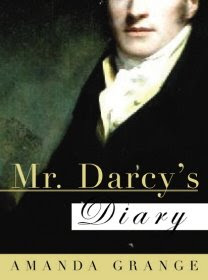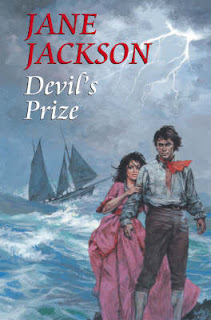 We’re delighted to have Amanda Grange as our guest today, author of Henry Tilney’s Diary, the latest in her line of takes on Austen leading men (and yes, she’s also tackled Wickham and Darcy as a vampire!). Amanda will give away a copy of her book, so please comment or ask her a question to enter into the drawing! Since Amanda is on UK time, we’ll be choosing a winner at 12 noon EST on Monday.
We’re delighted to have Amanda Grange as our guest today, author of Henry Tilney’s Diary, the latest in her line of takes on Austen leading men (and yes, she’s also tackled Wickham and Darcy as a vampire!). Amanda will give away a copy of her book, so please comment or ask her a question to enter into the drawing! Since Amanda is on UK time, we’ll be choosing a winner at 12 noon EST on Monday.
I was thoroughly engaged. I believe my money and my time, well spent; surely one of her best diaries to date! Austen fans may declare Mr. Darcy as their favorite, I dare say, Mr. Tilney improves on acquaintance. Even if you are not as familiar with Northanger Abbey as other Austen works, you will still find the tendency of Henry Tilney’s Diary to be altogether recommendable. A must for your reading list. Austenprose
I adore Henry Tilney and I’m so glad your book is about him. What do you like best about Henry?
I like his wit and his irreverence, in fact, I love them. He doesn’t take himself, or life, too seriously. He has an odd life in many ways: his mother died when he was young, his father is overbearing and his brother is dissolute, but Henry manages to rise above it all and go on being amusing and entertaining. Anyone who can maintain his good humour in the face of such adversity is someone I really love.
Did you find him more difficult to write than Austen’s more alpha male heroes such as Darcy and Wentworth?
If I’d written him as the first hero, I think I might have done, but after writing so many alpha males I was glad to have a break from them and write about someone warm and witty instead. I particularly enjoyed exploring his relationship with his sister, which we know to be a close one, and I think it’s this relationship that makes him so open and comfortable around women. I think that’s why Henry avoids so many of the problems the alpha heroes have in their romantic relationships. Although Darcy is close to his sister, it isn’t a relationship of equals as there is too much of an age gap, but Henry and Isabella are friends as well as siblings.
I read somewhere that Henry and Catherine are doomed to become Mr. and Mrs. Bennett—that Catherine’s sweetness and prettiness alone aren’t enough to sustain a long term relationship. How do you expand upon Catherine’s character?
I don’t see it like that. I think there is a solid basis for their future together because Henry is a clergyman and Catherine is a clergyman’s daughter, so they have the same kind of background, whereas Mr. and Mrs. Bennet came from different spheres of life: he was a landowner and she was the daughter of a country attorney.
And of course, Henry won’t have so much to try him. Catherine’s follies are the kind that she will naturally grow out of, in fact she’s already started to mature by the end of Northanger Abbey. She realises that she was a fool – however sweet – for imagining the laundry list was something sinister, and for thinking that the abbey was the scene of a murder. But I think she will remain imaginative, and that Henry will always appreciate this, because it’s one of the things that attracts him to her. There is a bit in Henry Tilney’s Diary which sums this up for me (Henry’s words):
“Not for me the unthinking, unfeeling woman who wears a halo of common sense and sees nothing in an abbey but an old building with inconvenient passages. Far rather would I have a young lady whose head is in the clouds, when those clouds are filled with such startling adventures.”
Did you make any interesting discoveries about Henry and the rest of the Tilneys?
Oh, yes, a lot. I started the book when Henry was fifteen so that I could explore his backstory and find out what makes him the man he becomes. I delved into his relationships with his parents, his brother and his sister. This led me to elaborate on Eleanor’s romantic relationship, and the ways in which Henry helped it along. I’ve always been intrigued by Eleanor, because although Austen tells us, at the end of Northanger Abbey, that Eleanor marries, we don’t see her husband in Northanger Abbey. So I created a house party at which she meets her future husband and Henry sympathises with her difficulties, namely that her father won’t countenance a match with a poor man.
I also had a lot of fun with Frederick. To begin with, I was going to make him a Wickham / Willoughby type, as he seems like a typical rake, but there are hints in Northanger Abbey that he is something more, and so I cast him as a disappointed romantic – which is often the reality behind a cynic. I created a backstory for him which explains his behaviour and also allows him to develop a friendship with Catherine, once they come to know each other better after Catherine’s engagement. I don’t want to say any more because I don’t want to spoil it, but I really enjoyed writing it.
I think we’re left at the end of Northanger Abbey with a divided extended family—the General isolated from his children, and a lot of awkwardness between Catherine and her former BFF Isabella. How do you think everyone will get on in future?
The General is reconciled to his children when the young man Eleanor wants to marry inherits a fortune and title – “never had the general loved his daughter so well in all her hours of companionship, utility, and patient endurance as when he first hailed her Your Ladyship!” (last chapter of Northanger Abbey). And through Eleanor’s good offices, he is reconciled to Henry and Catherine’s match. So although he will never be close to his children, he will at least be invited for Christmas, or vice versa! And in Henry Tilney’s Diary, I have him reconciled to Frederick as well, even though he hurt Frederick a great deal when Frederick was a young man.
As for Catherine and Isabelle, I don’t believe they will ever see each other again. They will move out of each other’s lives, and a good thing, too.
What research did you do for the book?
I read Northanger Abbey again very carefully, once to put myself back into the mood of the book and then again to make detailed notes on names, places etc. Then I worked out the timeline for the book and drew up a calendar of events. And then I set about reading some of Mrs. Radcliffe’s Gothic novels again, to choose one for Henry and Eleanor to read together in the early part of the book. I wanted to use The Mysteries of Udolpho, but somehow it didn’t gel – I wanted to use some actual quotes from the book, to give readers a flavour of the Regency Gothics, and the story of Udolpho didn’t fit. So I read through about half a dozen other Gothics until I came to A Sicilian Romance, which has a plot that beautifully complements Northanger Abbey and paves the way for Catherine’s wild imaginings. As to the other side of research – the historical detail side – I’ve written so many Regency novels that I now have files of notes I can turn to when I’m not sure about something, but for the most part I can move comfortably in that world because I’m familiar with it.
Who would your dreamteam movie cast be for the book?

Although I generally think of English actors for Austen characters, I actually think that Bradley Cooper would make a good Henry. I would choose Sophie McShera for Catherine. She plays Daisy the kitchen maid in Downton Abbey and I think she would have just the right mixture of naïveté and innocence for Catherine. Plus it would give the actress a chance to wear some better frocks!

 For Eleanor I would choose Carey Mulligan. She played Isabella in the recent TV adaptation of Northanger Abbey, but she’s a very versatile actress and I think she would also play Eleanor very well. For Frederick I would choose Rob James-Collier for Frederick. He plays Thomas in Downton Abbey – can you tell I’m obsessed with Downton Abbey? – and is perfect for a sleazy lothario, but I also think he’s capable of giving depth to the character, which is perfect for my view of Frederick.
For Eleanor I would choose Carey Mulligan. She played Isabella in the recent TV adaptation of Northanger Abbey, but she’s a very versatile actress and I think she would also play Eleanor very well. For Frederick I would choose Rob James-Collier for Frederick. He plays Thomas in Downton Abbey – can you tell I’m obsessed with Downton Abbey? – and is perfect for a sleazy lothario, but I also think he’s capable of giving depth to the character, which is perfect for my view of Frederick.
So let’s get chatting! Have you read Northanger Abbey? Who’s your favorite Austen hero (other than Darcy)?










